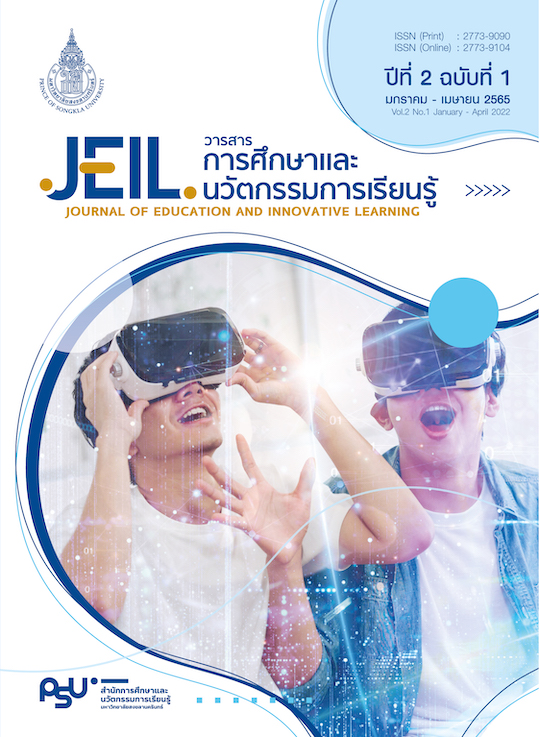ระบบบริหารจัดการเรียนรู้ออนไลน์วิชาทัศนศิลป์โดยใช้เทคนิคห้องเรียนกลับด้านสำหรับนักเรียนระดับชั้นประถมศึกษาปีที่ 4
Main Article Content
บทคัดย่อ
วัตถุประสงค์ของการวิจัยครั้งนี้ 1) เพื่อสร้างระบบบริหารจัดการเรียนรู้ออนไลน์วิชาทัศนศิลป์โดยใช้เทคนิคห้องเรียนกลับด้านสำหรับนักเรียนระดับชั้นประถมศึกษาปีที่ 4 2) เพื่อประเมินประสิทธิภาพของระบบบริหารจัดการเรียนรู้ออนไลน์วิชาทัศนศิลป์ตามเกณฑ์มาตรฐาน 80/80 3) เพื่อหาค่าดัชนีประสิทธิผลและผลสัมฤทธิ์ทางการเรียน และ 4) เพื่อศึกษาระดับความคิดเห็นของผู้เชี่ยวชาญที่มีต่อการเรียนด้วยระบบบริหารจัดการเรียนรู้ออนไลน์วิชาทัศนศิลป์ กลุ่มตัวอย่าง ได้แก่ นักเรียนชั้นประถมศึกษาปีที่ 4 โรงเรียนวัดเจ้าอาม สำนักงานเขตบางกอกน้อย กรุงเทพมหานคร จำนวน 36 คน ซึ่งได้มาจากการสุ่มแบบกลุ่มโดยใช้ห้องเรียนเป็นหน่วยสุ่ม เครื่องมือที่ใช้ในการวิจัย คือ 1) ระบบบริหารจัดการเรียนรู้ออนไลน์วิชาทัศนศิลป์โดยใช้เทคนิคห้องเรียนกลับด้าน 2) แบบทดสอบวัดผลสัมฤทธิ์ทางการเรียน และ 3) แบบประเมินคุณภาพของระบบโดยผู้เชี่ยวชาญ สถิติที่ใช้ในการวิเคราะห์ข้อมูล คือ ร้อยละ ค่าเฉลี่ย ส่วนเบี่ยงเบนมาตรฐาน และค่าสถิติทดสอบที
ผลการวิจัยพบว่า 1) ระบบบริหารจัดการเรียนรู้ออนไลน์วิชาทัศนศิลป์ที่สร้างขึ้นเหมาะสำหรับการบริหารจัดการเรียนรู้ออนไลน์โดยใช้เทคนิคห้องเรียนกลับด้าน เพราะมีการใช้งานที่ไม่ยุ่งยาก 2) ระบบบริหารจัดการเรียนรู้ออนไลน์วิชาทัศนศิลป์ที่สร้างขึ้นมีประสิทธิภาพ 81.44/83.89 ซึ่งสอดคล้องกับเกณฑ์มาตรฐาน 80/80 3) ค่าดัชนีประสิทธิผลเท่ากับ .8261 และนักเรียนที่เรียนด้วยระบบดังกล่าวมีผลสัมฤทธิ์ทางการเรียนหลังเรียนสูงกว่าก่อนเรียนอย่างมีนัยสำคัญทางสถิติที่ระดับ .05 และ 4) ผู้เชี่ยวชาญมีความคิดเห็นเกี่ยวกับระบบบริหารจัดการเรียนรู้ออนไลน์วิชาทัศนศิลป์อยู่ในระดับมากเช่นกัน
Article Details

อนุญาตภายใต้เงื่อนไข Creative Commons Attribution-NonCommercial-NoDerivatives 4.0 International License.
เนื้อหาและข้อมูลในบทความที่ตีพิมพ์ในวารสารการศึกษาและนวัตกรรมการเรียนรู้ ถือเป็นข้อคิดเห็นและความรับผิดชอบของผู้เขียน ซึ่งกองบรรณาธิการวารสาร ไม่จำเป็นต้องเห็นด้วยหรือร่วมรับผิดชอบใด ๆ และไม่สงวนสิทธิ์การคัดลอกบทความเพื่อใช้ประโยชน์ทางวิชาการ แต่ให้อ้างอิงข้อมูลแสดงที่มาของบทความทุกครั้งที่นำไปใช้ประโยชน์
เอกสารอ้างอิง
Baytiyeh, H. (2017). The flipped classroom model: when technology enhances professional skills. International Journal of Information and Learning Technology, 34(1), 51-62. doi:10.1108/IJILT-07-2016-0025
Biswas, P. (2020). Develop learning management system without breaking a sweat. Retrieved from https://www.unifiedinfotech.net/blog/LMS/
Branch, R. M. (2018). New media for educational change. In L. Deng, W. Ma, & C. W. Rose Fong (Eds.), New Media for Educational Change. Educational Communications and Technology Yearbook (3-8). Springer, Singapore. https://doi.org/10.1007/978-981-10-8896-4_1
Chaisena, A., Wachirawongpaisarn, S., & Phakamach, P. (2021). The development of online lesson by moodle program on the topic of simple programming design for computational
science course for Prathomsuksa 6 students. Paper presented at the Second NIDTEP Academic Conference Thailand 2021, Nakhon Pathom, Thailand. [in Thai]
Cruz, F. J. F., G·lvez, I. E., & Santaolalla, R. C. (2016). Impact of quality management systems on teaching-learning processes. Quality Assurance in Education, 24(3), 394-415. doi:10.1108/QAE-09-2013-0037
Das, A., Lam, T. K., Thomas, S., Richardson, J., Kam, B. H., Lau, K. H. and Nkhoma, M. Z. (2019). Flipped classroom pedagogy: Using pre-class videos in an undergraduate business information systems management course. Education + Training, 61(6), 756-774. doi:10.1108/ET-06-2018-0133
Kant, N., Prasad, K. D., & Anjali, K. (2021). Selecting an appropriate learning management system in open and distance learning: a strategic approach. Asian Association of Open Universities Journal, 16(1), 79-97. doi:10.1108/AAOUJ-09-2020-0075
Lento, C. (2016). Promoting active learning in introductory financial accounting through the flipped classroom design. Journal of Applied Research in Higher Education, 8(1), 72-87. doi:10.1108/JARHE-01-2015-0005
Lyons, P., & Bandura, R. P. (2019). Case-based modeling: fostering expertise development and small group learning. European Journal of Training and Development, 43(7/8), 767-782. doi:10.1108/EJTD-01-2019-0009
Office of the National Education Commission. (2019). National Education Act (No. 4), B.E. 2562 (2019). Bangkok, Thailand: Pimdeekarnpim. [in Thai]
Nederveld, A., & Berge, Z. L. (2015). Flipped learning in the workplace. Journal of Workplace Learning, 27(2), 162-172. doi:10.1108/JWL-06-2014-0044
Phakamach, P., Wachirawongpaisarn, S., Phomdee, R., Vachungngern, P., & Rodniam, N. (2021). The effective organizational strategy factors of success of using the digital education platforms in Higher Education Institutions in Northeastern Region. Proceedings of the 9th PSU Education Conference 2021, 283-293. Retrieved from https://educonf.psu.ac.th/download/proceedings/9thPSUEd.pdf [in Thai]
Qiang, J. (2019). Effects of digital flipped classroom teaching method integrated cooperative learning model on learning motivation and outcome. The Electronic Library, 37(5), 842-859. doi:10.1108/EL-02-2019-0024
Scott, C. E., Green, L. E., & Etheridge, D. L. (2016). A comparison between flipped and lecture-based instruction in the calculus classroom. Journal of Applied Research in Higher Education, 8(2), 252-264. doi:10.1108/JARHE-04-2015-0024
Sinlarat, P. (2020). The path to excellence in Thai education. RICE Journal of Creative Entrepreneurship and Management, 1(2), 60-75.
Smith, K. D. (2020). Is it face time or structure and accountability that matter? Moving from a flipped to a flipped/hybrid classroom. Journal of Applied Research in Higher Education, 13(2), 609-621. doi:10.1108/JARHE-08-2019-0229
Wachirawongpaisarn, S., Soeikrathoke, P., & Phakamach, P. (2021a). The development of online teaching-learning platforms on smes management using flipped classroom techniques for undergraduate students of the Faculty of Business Administration. Paper presented at 16th Professional and Organizational Development Network of Thailand Higher Education Annual Conference 2021, Bangkok, Thailand. [in Thai]
Wachirawongpaisarn, S., Soeikrathoke, P., & Phakamach, P. (2021b). The development of online teaching-learning platforms on the topic of financial accounting using collaborative learning management techniques for Undergraduate Students of the Faculty of Business Administration. Paper presented at 16th Professional and Organizational Development Network of Thailand Higher Education Annual Conference 2021, Bangkok, Thailand. [in Thai]
Zainuddin, Z., Haruna, H., Li, X., Zhang, Y., & Chu, S. K. W. (2019). A systematic review of flipped classroom empirical evidence from different fields: what are the gaps and future trends? On the Horizon, 27(2), 72-86. doi:10.1108/OTH-09-2018-0027
Zainuddin, Z., Zhang, Y., Li, X., Chu, S. K. W., Idris, S., & Keumala, C. M. (2019). Research trends in flipped classroom empirical evidence from 2017 to 2018: A content analysis. Interactive Technology and Smart Education, 16(3), 255-277. doi:10.1108/ITSE-10-2018-0082


